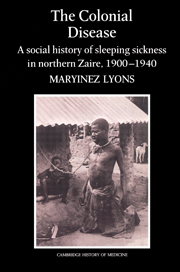Book contents
- Frontmatter
- Contents
- List of maps
- List of plates
- List of tables
- Preface
- List of abbreviations
- Map 1 Africa: political
- 1 Disease and medicine in the history of Africa
- 2 From private empire to public colony
- 3 Mise en valeur: economic exploitation
- 4 Epidemiology and ecology of human sleeping sickness
- 5 ‘The Lure of the Exotic’: sleeping sickness, tropical medicine and imperialism
- 6 Discovery: Liverpool scientists in the Congo
- 7 The campaign. Part one: sleeping sickness and social medicine
- 8 The campaign. Part two: the surveys and tensions
- 9 The African response
- 10 Public health, social engineering and African lives
- 11 Conclusion and legacy
- Appendices
- Notes
- Select bibliography
- Index
1 - Disease and medicine in the history of Africa
Published online by Cambridge University Press: 06 January 2010
- Frontmatter
- Contents
- List of maps
- List of plates
- List of tables
- Preface
- List of abbreviations
- Map 1 Africa: political
- 1 Disease and medicine in the history of Africa
- 2 From private empire to public colony
- 3 Mise en valeur: economic exploitation
- 4 Epidemiology and ecology of human sleeping sickness
- 5 ‘The Lure of the Exotic’: sleeping sickness, tropical medicine and imperialism
- 6 Discovery: Liverpool scientists in the Congo
- 7 The campaign. Part one: sleeping sickness and social medicine
- 8 The campaign. Part two: the surveys and tensions
- 9 The African response
- 10 Public health, social engineering and African lives
- 11 Conclusion and legacy
- Appendices
- Notes
- Select bibliography
- Index
Summary
The historian can approach the subjects of disease and medicine in a number of ways. More traditional historians of medicine concentrate on the impressive scientific achievements in Western medicine, beginning their story with medical knowledge and practices of the ancient Greeks and Romans. Other medical historians are concerned with the social history of medicine although their focus remains on technical and scientific achievements. They discuss societal relations in connection with the development of medical science and they tend to be more critical and analytical than their more traditional colleagues. Both of these groups of historians are generally of the opinion that Western biomedicine is the correct path to pursue in the effort to salve and solve the ills of mankind. A number of twentieth-century works have dealt with the history of medicine in the African context. Most have been written by former colonial or missionary medics who often follow the more traditional approach and take the form of a celebration of man's intellectual advance as demonstrated by his increasing ability not only to comprehend his environment but to shape it to suit himself. Titles such as Gelfand's Tropical Victory and Ransford's Bid the Sickness Cease espouse this notion.
What is needed now is for historians to begin to put such work back into its historical context. The study of medicine in history can result in a much richer view of man's past by pulling into the analysis the subjects of disease and medicine as two of the factors among many in the overall process of historical change. In this way, the roles of disease and medicine are fully integrated in historical explanation.
- Type
- Chapter
- Information
- The Colonial DiseaseA Social History of Sleeping Sickness in Northern Zaire, 1900–1940, pp. 1 - 7Publisher: Cambridge University PressPrint publication year: 1992

